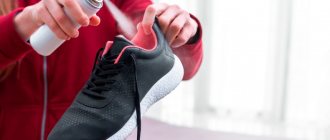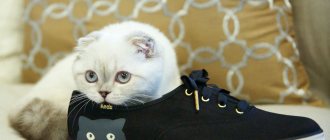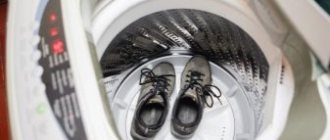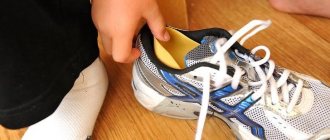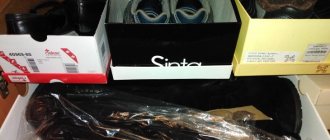It’s even difficult to imagine a problem so delicate and at the same time obvious to people with a good sense of smell who are around you - this is the unpleasant aroma of shoes. After all, a person takes off his shoes anywhere: in a shoe store, at a party, or in the gym locker room. We are designed in such a way that we need to feel comfortable and confident in different situations.
This problem is relevant for people of any age - both men and women . No one wants to surrender to the onslaught of such an insidious enemy. There are empirically proven means specifically to combat this common nuisance. Let's look at accessible and at the same time effective ways to deal with the “stinking” enemy and find out how you can get rid of the smell in your shoes.
Causes
Sweating feet is the main reason that affects the scent of shoes. It is noteworthy that it is not sweat that smells, but the waste products of bacteria located there. They multiply in humidity and confined spaces. Therefore, open shoes do not smell; closed shoes are considered problematic because they are less ventilated and require careful care. Constantly wet feet can affect the life of your shoes.
Unpleasant odor from shoes can be eliminated in many ways.
Odor appears much less often in open shoes. What's the secret? Ventilation! Regular drying, preferably in the open air or in the sun, gives excellent results. The fact is that the smell in shoes tends to accumulate and, ultimately, irritate not only us, but also the people around us. Therefore, while showing attention and respect to those around you, take care of the condition of your feet and boots.
Textile shoes, as well as any sports shoes, need to be cleaned regularly from the inside . Wipe the insoles and the inside with a soapy solution, being careful not to get them wet. Also, in the absence of water, shoes are treated with ammonia. Sneakers and fabric ballet flats can be washed in the washing machine using not very hot water and without wringing them out. When rinsing, you can add a little vinegar to kill germs. After which the shoes are sent to dry until completely dry.
How to whiten sneakers: methods and tips
When starting to whiten your sneakers, you first need to prepare them for cleaning.
- Remove the laces and insoles from the sneakers and wash them in warm soapy water. If using this procedure it was not possible to achieve whiteness of the laces, then you need to add a stain remover to the water and wash it thoroughly.
It is also worth paying attention to the fact that insoles cannot be dried in dryers or on heating devices - this will lead to their damage.
- After the laces and insoles are washed, you need to carefully inspect the sole of the sneakers for small objects and pebbles.
Disinfectant solutions against odor in shoes
Some liquid products in your home have a detrimental effect on bacteria in shoes, therefore eliminating odors in them.
An alcohol infusion (vodka, ammonia, boric acid ) will help remove odor from shoes, especially if the odor is not very persistent. Any tincture, vodka or alcohol are known antibiotics. Also treat the inner surface of the shoe and leave the disc soaked in alcohol infusion in the toe of the shoe. The largest number of microbes accumulate there. Leave it like this overnight. Then dry. Vinegar. Another natural antimicrobial agent suitable for processing is acetic acid. Oddly enough, but vinegar solution knows how to eliminate odor in shoes! Take a six or nine percent vinegar solution. You can use wine or apple. How to get rid of odor in shoes using vinegar? Soak a cotton pad and apply to the problem area. The disadvantage of this method is that the substance has a strong aroma and intensive ventilation is required.
Using a vinegar solution, you can rid your shoes of odor.
A couple of drops of citric acid or lavender oil can not only eliminate the odor, but prevent its appearance: before using your shoes, drop a couple of drops of one of the substances on the insoles of your shoes. Hydrogen peroxide. The inner surface of the shoe is treated with a cotton pad with peroxide, or a little liquid is poured inside, and the insole is also soaked. Next, the shoes are thoroughly dried for about a day. Perhaps this is one of the most effective methods, although with its own nuances. For example: peroxide can lighten the color of the product. Before processing, test on a small and inconspicuous area of the material.
What kind of remedy is this?
Boric acid is a weak reagent, odorless and colorless powder. For various products, it is dissolved in water, alcohol, glycerin and petroleum jelly. Found naturally in volcanic hot springs and mineral waters.
Important! The reagent gives the fire a green tint.
In pharmacology it is found in the form of ointment, alcohol or aqueous solution, powder. Used in agriculture for seed treatment, plant nutrition and insect control. Cosmetologists use it to combat acne and blackheads. Included in lotions for skin care for hyperhidrosis, in other words, excessive sweating.
Absorbents
Soda. How and with what to get rid of odor in shoes? The cheapest antiseptic in the world, which is also easy to use. Place the boot inside and leave overnight. In the morning, use a vacuum cleaner to remove all the baking soda from your shoes. This product has antiseptic and absorbent properties. The disadvantages include the time spent vacuuming. Filler. If you are the happy owner of a cat and use cat litter, know that you can put it in your shoes to remove odors, because the purpose of the litter is, among other things, to eliminate unpleasant odors. A modern way to dry shoes: for this you will need cat litter pellets. Pour the balls into a bag or a regular sock, tie it and put it in your shoes or boots. In the morning the shoes will be dry and fresh. Activated carbon. You can pour crushed coal according to the principle of soda and remove it in the same way. There are also carbon insoles that give excellent results. Need frequent replacement.
If there is an unpleasant odor in your shoes, get rid of it using available means.
Reviews
Reviews show how effective this method is for combating hyperhidrosis.
I used foot odor powder. I made baths and powdered my feet. After 3 months the situation improved. Although I continue to struggle with hyperhidrosis, the smell has become less strong and no longer attracts the attention of others.
Igor, Vladivostok, 38 years old.
I use the composition not only in the legs, but also in the armpits. The sweat became less severe. I don’t like the process of use; there are drugs that do not need to be prepared in advance. But the cost of the medicine is affordable and you do not need a prescription from a doctor.
Angelina, 26 years old, Bryansk.
Everyone decides for themselves which anti-sweating remedy to use. Boric acid is an effective and inexpensive method available to everyone. The medicine is not suitable for everyone. But most patients leave positive reviews about the inexpensive and effective medicine.
General guidelines for removing odor from shoes
If you have this problem, you need several pairs of shoes for the season . So that after several hours of wear, you can change your shoes and leave the shoes to rest. Have a change of shoes at work . Try to purchase shoes only from natural ingredients . Wear socks made from natural or partially natural materials . Maintain good body and foot hygiene ; if possible, use antiperspirants or deodorants for the feet. Smoking and excessive alcohol consumption affect natural body odors - get rid of the addiction. Too spicy and hot foods are not suitable for people with excessive sweating. Choose shoes only from reliable manufacturers who are responsible for quality. Inappropriate materials do not allow the skin to breathe. Doctors say that one in five people have serious foot problems due to the wrong choice of shoes. In summer, give preference to clogs and sandals instead of closed shoes. Wear shoes that fit properly . Get rid of calluses and dead tissue. Regularly take special baths for problem feet.
Often the reason for bad shoe odor lies in improper foot care.
Are there any contraindications?
Despite the usefulness of boric acid, its solutions cannot be used on an ongoing basis . This is a toxic element, it accumulates in the body and affects all cells. Poisoning causes poor health and can provoke a number of diseases affecting the functioning of the brain, mucous membranes, skin and hematopoietic cells.
Boric acid is contraindicated:
children;- during pregnancy and lactation;
- patients with bronchial asthma;
- people with kidney pathology.
If symptoms of poisoning or adverse reactions appear, stop using it and immediately go to the hospital. Side effects include: headache, nausea, gastrointestinal disturbances, convulsions and anaphylactic shock.
Russian national costume (photo)
Star-studded wedding dresses
Foot bath recipes to help you get rid of shoe odors
Tea ceremony for your feet. Brew in the proportion of two tea bags or two teaspoons of tea leaves per liter. When the infusion has cooled, pour it into a bowl and soak your feet for about 15 minutes. Both black and green tea will do. Repeat as often as possible. Oak bark is a powerful remedy for treating sweaty feet. A water infusion is made: two tablespoons of crushed bark per one and a half liters of boiling water. Close the lid and infuse. Soak your feet in the cooled herbal decoction for 20 minutes. Carry out the procedure every day. Chamomile, sage or rosehip . Can be used individually or made into herbal teas. Brew 2-3 tablespoons per liter of water, cool, strain and use for feet every day, in sessions of 15-20 minutes. Boric acid . Baths with mixtures of boric and citric acid powder are another cheap and easy way to solve the problem of sweating feet. Acids have a pronounced antimicrobial and antifungal effect.
Effect on the human body
Boric acid acts in such a way that, penetrating pathogenic microorganisms, it destroys them, destroying proteins. It does not decompose in the body and is excreted entirely. This determines its stability and safety for humans when used within reasonable limits. But you need to remember: “The lack of taste, smell and irritation has given boric acid the false reputation of a harmless substance” (Science and Life magazine).
Boric acid actively penetrates the body through the skin and mucous tissues. May be ingested by inhalation of vapors. The maximum permissible concentration in the air is about 10 milligrams per cubic meter.
Smell of mold
What if the smell from your shoes is not caused by sweaty feet, but by mold?
Shoes with mold are even dangerous to wear without treatment, as you can infect your feet with fungus.
Take this issue seriously. You need to clean your shoes with soap and water, both on the outside and on the inside. To destroy the fungus, a bleach solution is needed; it is used to treat the product from the inside. After this, ammonia mixed with vodka is additionally used. Then the shoes are dried naturally or in the sun.
Cat's "disgrace"
It also happens that the cat, in retaliation, marks his slippers, or even his favorite shoes. What can you do to drown out this “dizzying” aroma? Fabric shoes can be easily cleaned in the washing machine. Only the smell of a cat's surprise is so strong and corrosive that it will require two or three washes . Leather products will not survive such experiments, so clean the problem area on your shoes with soapy water and a brush. Then treat with a solution of acid, citric or acetic. After that with alcohol. Since the aroma is extremely persistent, it returns when the shoes are heated and moistened.
Take care of your shoes not only outside, but also inside
Properties of boric acid
The acid has received a wide range of uses in medicine for its antiseptic properties. It is used for skin diseases, treatment of wounds and eyes. For ear inflammation, a 0.5-3% alcohol solution will help. Boric ointment is also used to treat pediculosis.
This is an important trace element for the full life of plants. It improves the quality and quantity of the crop and prevents the occurrence of certain diseases.
Preventing odor in shoes
Cleanliness is the key not only to health, but also to the wonderful aroma of your body and clothes. A natural requirement in preventing odor is daily foot washing and socks . Of course, there are individual cases when, despite all the desire to be clean, the smell is still present in the shoes. Quite often, fungal diseases of the feet or nails serve as the basis for the growth of pathogenic microflora in shoes.
Keep your feet dry. After bathing, you should thoroughly dry your feet, especially between the toes, to protect your feet from infection and prevent the growth of fungus.
Therefore, we treat the fungus with diligence, reducing the likelihood of stench. Recommendations from experienced people who have this problem: take spare socks with you and change them as needed. You can use antifungal ointment for prevention and never wear shoes on bare feet.
Also, to prolong the effect of clean shoes, use oils with your favorite scents . You can apply a couple of drops under the insole. Dry citrus peels have the same effect. Keep them in your dry shoes every time. You can put a few dried cloves in your shoes at night.
Using dry deodorant
For dry deodorant you will need boron powder and talc. You can add tea tree or orange oil. These ingredients will give the deodorant the necessary consistency and pleasant smell.
Apply the mixture only to clean and dry skin. Pay special attention to the skin between the fingers.
